WDI investigated how the cost of harm reduction services varied across health centers within the country of Georgia, and identified potential cost-saving opportunities related to the delivery model. Within Georgia’s current HIV/AIDS program, the Global Fund supports harm reduction services for injection drug users. However, Georgia is expected to fully transition to local financing of its HIV/AIDS and TB programs by 2022. In preparation for this transition, Georgia has been interested in identifying ways to reduce the cost of harm reduction services to ensure sustainability. While the focus of WDI’s work was harm reduction services in Georgia, the principles behind it are applicable to other partner countries, particularly to those that are transitioning. This work was done under WDI’s ongoing contract with the Global Fund.
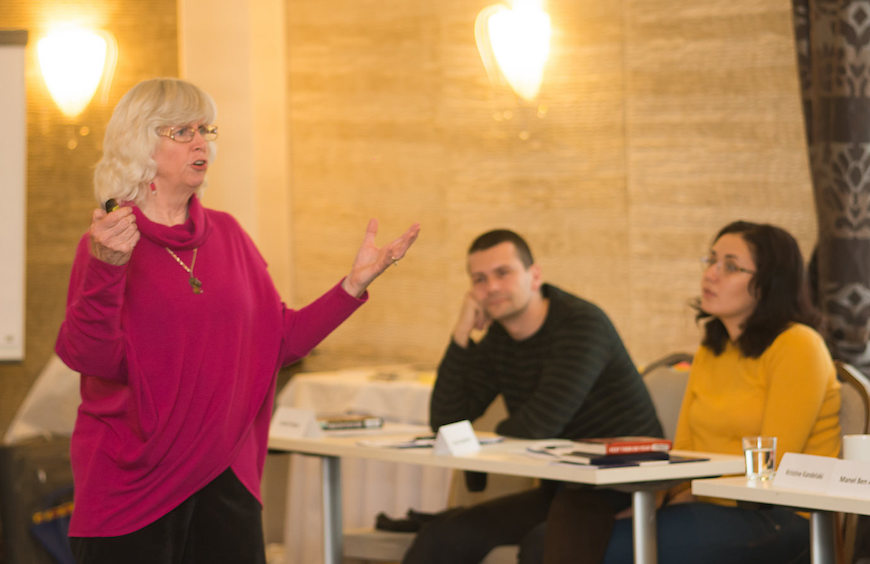
Professor Linda Gasser, WDI faculty affiliate and a founder of the Central Europe Human Resource Education Initiative, who led the NGO management session.
Non-governmental organizations (NGOs) around the world are facing increased scrutiny and even intimidation by government ministries and regulators in several emerging democracies. Equipping them with the managerial skills and tools they need to advance positive social and political change is critical to their missions, and was the focus of a four-day workshop in Bratislava, Slovakia earlier this month.
WDI, along with the Weiser Center for Europe and Eurasia at the University of Michigan and the Slovakia-based Pontis Foundation, organized the NGO Leadership Workshop. Twenty-five NGO leaders from 14 countries, including Uzbekistan, Kazakhstan, Ukraine, Moldova, and Georgia, participated in several highly interactive sessions during the workshop.
This was the second year WDI partnered with the Weiser Center, which sponsored the event, and the Pontis Foundation to coordinate the NGO Leadership Workshop. It comes at an especially challenging time for many NGOs. As communist regimes fell in Central and Eastern Europe, South Eastern Europe, and the former Soviet Union, civil society organizations emerged to help support the fledgling democracies in these regions. However, distrust in NGOs has generated new problems for their managers.
“NGOs from across this region are in a particularly difficult position these days,” said Amy Gillett, vice president of WDI’s Education Initiative. “Some of the countries stigmatize them as ‘foreign agents’ — meaning they are an enemy of the state and, therefore, under surveillance. This creates an atmosphere where people in the society do not want to associate with them.”
The NGO Leadership Workshop, held Dec. 6-9, attempted to maximize the effectiveness of the organizations by giving their leaders the necessary skills to properly interact with international partners, government stakeholders and the public. The daily workshop topics were: planning and sustainability of NGOs; essentials of NGO management; marketing strategy for the NGO; and, advocacy and public policy building.
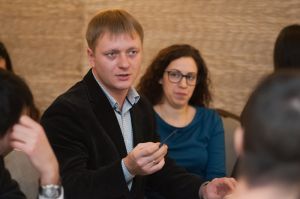 “The changes in the government of these countries cause tremendous stress,” said Professor Linda Gasser, WDI faculty affiliate and a founder of the Central Europe Human Resource Education Initiative, who led the NGO management session. “People need to find ways to mitigate this. The great value in this program is that participants are networking and understanding that there are others experiencing similar things.”
“The changes in the government of these countries cause tremendous stress,” said Professor Linda Gasser, WDI faculty affiliate and a founder of the Central Europe Human Resource Education Initiative, who led the NGO management session. “People need to find ways to mitigate this. The great value in this program is that participants are networking and understanding that there are others experiencing similar things.”
Many workshop participants cited the interaction with faculty members, guest speakers and each other as a key benefit of the program. They plan to remain in contact in the months to come and also will receive additional training through WDI’s interactive ExtendEd portal. This portal, designed and implemented by WDI, guides participants’ learning before, during and after a program, and encourages them to apply this knowledge back at their job.
Another workshop highlight was a presentation on the development of civil society in Slovakia by Martin Butora, who served as that country’s ambassador to the U.S. from 1999-2003. He also was one of the founders of the political movement Public Against Violence, which opposed communist rule in Slovakia.
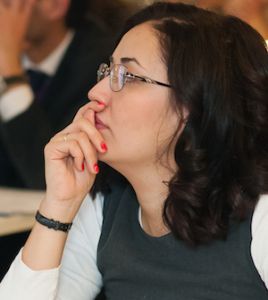 The presentation was followed by an engaging question-and-answer session with Ron Weiser, former U.S. ambassador to the Slovakia. In 2004, Weiser received the White Double Cross —the highest award given to non-Slovaks — from Slovak President Rudolph Schuster for his work as ambassador.
The presentation was followed by an engaging question-and-answer session with Ron Weiser, former U.S. ambassador to the Slovakia. In 2004, Weiser received the White Double Cross —the highest award given to non-Slovaks — from Slovak President Rudolph Schuster for his work as ambassador.
“Regardless of the countries we come from, we are all experiencing the same problems,” said Nadiia Bureiko, vice head of the Ukraine NGO, Quadrivium. “This program has created a valuable network for future cooperation.”
Stefan Veljkovic, program director of the Kosovo NGO, YEC Synergy, praised the workshop faculty and speakers. He said he learned how to build organizational capacity, recruit people to join a cause and that there are “many ways to get across a message.”
Lenka Surotchak, executive director of the Pontis Foundation, said it might be difficult for someone living in an established democracy to understand the day-to-day fear, struggles and sacrifices of “people fighting for rule of law and attempting to undertake democracy.”
“They do it because they believe in freedom and a better future in their country,” she said. “Interaction with the faculty from one of the renowned U.S. universities, the University of Michigan, the knowledge and belief in their skills, mission and work give them the power and optimism to continue their important job.”
The University of Michigan’s Ross School of Business recently celebrated 25 years of Multidisciplinary Action Projects (MAPs), an action-based learning course for first-year MBA students who receive guidance from faculty advisers. During that span, 10,438 full-time MBA students have worked on 2,010 projects in 92 countries with 1,352 sponsor companies. In recent years, executive, evening and weekend MBA students have participated in MAPs as well.

WDI began sponsoring international MAP projects for Ross in 1992, the year after they began, and have funded and provided faculty advisers for about 225 projects in the 24 years since. WDI President Paul Clyde said MAPs are “one of many tools available to pursue our mission” to develop knowledge and capability that improves the effectiveness of firms and social welfare in emerging economies.
“We’re using it in specific initiatives as a way of building relationships and developing solutions in the field with our partners,” he said. “For us, MAPs aren’t an isolated event, they are part of a longer-term relationship.”
WDI Senior Research Fellow Ted London said MAPs not only benefit students and sponsoring organizations, but also faculty members who advise the projects. It is a valuable way to keep in touch with multiple organizations, understand their latest successes and roadblocks, and think more broadly about solutions.
“I enjoy MAP so much, in part, because it gives me the opportunity to listen and learn,” said London, who also is vice president of WDI’s Scaling Impact Initiative. “These are often organizations we have worked with for many years and it’s great to have another reason for a frank and in-depth engagement.”
Each MAP project requires analytical rigor, critical thinking, and teamwork from the students. Teams of 4-6 students spend seven weeks exclusively working on their MAP projects, including 3-4 weeks in the field. Sponsors receive top-notch deliverables and data-driven recommendations from the team.
After learning about their projects and conducting research in the classroom for several weeks, the students then spend three to four weeks working alongside their project sponsors in the field.
Clyde, who served as an adviser to his first MAP team in 1998 while on the faculty at Ross, said the student projects are a “fun way to teach.”
“Something always comes up that’s an illustration of a point made in their core courses,” he said. “I distinctly remember times when you could see the lightbulb go off and they suddenly understood the concept because they were in that setting, they were living it in the field.”
WDI’s Education Initiative recently began deploying MAP teams to help further its mission of identifying and sharing new ways to enhance management education in emerging markets. This past winter, two MAP teams worked on entrepreneurship projects in Kosovo and Morocco, and one team examined e-learning at a major technical university in Georgia.
“MAP teams allow us to offer our education partners in-depth strategic guidance and for us to be able to consolidate learnings across projects and thereby identify needs, trends, and best practices in management education,” said Amy Gillett, vice president of the Education Initiative. “The projects we’ve sourced related to entrepreneurship education are helping us develop new models and tools to share with a global audience through WDI’s new Entrepreneurship Development Center for emerging markets.”
London, who has been a faculty adviser to about 50 student teams since joining WDI in 2004, called MAPs a “virtuous cycle” that benefits students, WDI’s partners, and the institute’s research.
MAPs embed students with an organization, whether it’s a nonprofit or a corporation, and apply what they have learned in school to help solve an issue the organization is facing.
“They’re solving real problems and understanding the context,” London said “They’re on the ground 3-5 weeks so they have a chance to get acclimated and then really get engaged.”
Clyde said MAPs also are an opportunity for students “to learn how to work in a team setting, to test out their leadership skills, and learn about other cultures.”
Benefitting Organizations, Influencing Students
Allie Schachter was a member of a MAP team that worked with a company interested in rolling out an active learning platform in an emerging market context. Managed by WDI’s Education Initiative, Schachter and her team embedded with the Stockholm School of Economics in Riga, Latvia. Schachter said she enjoyed applying what she had learned in the classroom to a real-world business problem. (Watch a video of Schachter talking about the MAP project below).
“My MAP experience solidified and contextualized many of the concepts discussed in class, which was an incomparable educational experience,” she said. “It was a great opportunity to work with a group on a very large and involved project. Throughout the course of our project, we honed our ability to work together, delegated tasks to one another, and navigated difficult conversations and challenges together.
“It was a really great opportunity to gain experience working for and with others. I will certainly carry those experiences forward when working with teams at work and in future classes.”
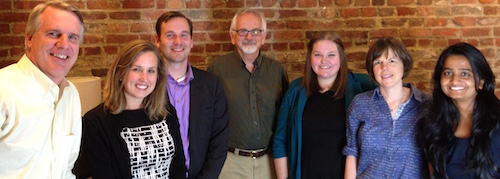
Perry Samson, center, poses with WDI President Paul Clyde, left, WDI Vice President of the Education Initiative Amy Gillett, second from right, and MAP team members.
Perry Samson, the Arthur Thurnau Professor in the Department of Atmospheric, Oceanic, and Space Sciences at the University of Michigan, developed the learning platform and enjoyed working with the MAP students to see how his product performed in an international setting. He called it “invigorating” and a “wonderful interaction” with the students, who were “thinking more deeply about all these things.”
“They thought of a number of things I didn’t think of,” he said. “They provided good insight on what drives adoption of technology in education and identified a number of suggested process changes.”

Diana Pauna
Diana Pauna, former pro-rector of the Stockholm School of Economics in Riga, found the project very useful for her university. She and her colleagues and students valued the opportunity to interact with a highly engaged team of MBA students from the University of Michigan.
“The project was extremely successful and a good learning experience for us,” she said.
London said because the MAPs are sourced with WDI partners, he and others are able to structure a good project that challenges students and benefits the organization.
“MAPs are of real value to the partners,” he said. “They do come back year after year. It’s a pressing issue they’re very keen to solve. Generally they have great outputs and create a substantial amount for the partners. That’s the reason we have a lot of repeats over the years.”
London and Clyde said MAPs can impact organizations for years to come, and can be life changing for students. London said MAP projects give students “an opportunity to see how the majority of the world lives and transacts, and it is something I believe they will carry with them the rest of their lives.”
He said one of the pleasures he gets from traveling with the students is watching them grow from the experience. Some students are committed to working internationally after graduation and have already traveled overseas. But others who will likely live and work in the U.S. when their MBA studies are complete still want to work internationally at least once.
“This isn’t what they are going to do with their life but it is something they want to experience,” London said. “We take them places and expose them to things they might not necessarily ever be exposed to. When we’re in Uganda, we’re not necessarily staying in the capital city. When we’re in Benin, we’re out in the bush.
“You can see the trepidation in some of them before they leave, and a sense of confidence when they get back,” he said. “And a whole new awareness of this world.”
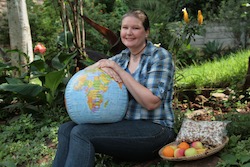
Former WDI MAP team member and WDI summer intern Patricia Griffin.
One student whose MAP experience changed her career path was Patricia Griffin, who was certain she would work for a U.S. automaker in a domestic car plant after getting her MBA. But she decided to join a WDI-sponsored MAP team headed by Clyde and that would work with a Uganda hospital.
Clyde remembers the team functioned without electricity for the first two weeks of its four-week stay. He said it was tough on the team but Griffin was energized by her experience and instead of heading to the auto plant now lives and works full time in Kenya.
“Questioning my assumptions and taking nothing for granted has become a basic mode of operation for how I conduct my career and life,” Griffin said of her time in Uganda. “That’s a direct result of the MAP experience.”
Part of the mission of WDI’s Education Initiative is to identify and share new ways to enhance management education in emerging markets. This can be achieved through the adoption of new business models, or the introduction of new programs or technologies, or a combination.
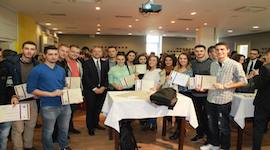
To assist in this mission, the Education Initiative will soon deploy three student teams comprised of Weekend MBA students from the University of Michigan’s Ross School of Business as part of the school’s Multidisciplinary Action Projects (MAP) program. MAP is an immersive learning course offered at Ross during which students tackle a real-world strategic project under the guidance of faculty advisors.
Two MAP teams will work on entrepreneurship projects in Kosovo and Morocco, and one team will examine e-learning at a major technical university in Georgia.
“The MAP project teams will work with local university faculty, administrators, and business people in the three countries,” said Amy Gillett, vice president of WDI’s Education Initiative. “After gaining an appreciation for the local context and challenges, the teams will make recommendations for how to move forward in leveraging global best practices, adapting them to local realities, and coming up with effective solutions.
“WDI will then share their findings, stimulating a fruitful exchange of ideas across the emerging markets. We hope this will ultimately lead to more effective delivery of management education.”
The MAP project focused on e-learning will travel to Georgian Technical University (GTU) in Tbilisi. At GTU, e-learning is mainly blended with traditional, lecture-style learning, and is considered a supplement to strengthen and enrich learning results. Most students there are well versed in technology and would like to see more e-learning components in their course offerings. However, GTU lacks an overall strategy on how to pay for and implement e-learning across the campus.
The MAP team will research current global best practices in e-learning, examine existing e-learning programs at GTU, and look at its technology infrastructure – among other things – to develop an overall strategy.
“We think that e-learning could improve education at GTU by making the formal educational process more flexible and learner-oriented, and reach a wider target group,” said Tamar Lominadze, professor of informatics and control systems at GTU.
Lominadze recently came to the University of Michigan as a visiting scholar at the Weiser Center for Europe & Eurasia. While there, she met WDI’s Gillett and discussed a previous MAP project with the Stockholm School of Economics in Riga, Latvia.
“I asked Amy about the possibility of developing a similar project for GTU in the field of e-learning,” Lominadze said.
With the upcoming MAP project, “we hope to obtain a more clear, strategic vision for the further long-term sustainable development of e-learning at GTU,” she said. “We have several problems to research. We hope that as a result of this project we will be able develop and implement the e-earning process at GTU in the most timely and cost-efficient way.”
The first of two entrepreneurship projects is with the Business Support Centre Kosovo (BSCK), located in the capital of Pristina. BSCK has leveraged many different support tools to promote new venture creation by young entrepreneurs, including entrepreneurship training, funding (grant or bank loans with subsidized interest rates), and no-cost consultancy.
The Ross MAP team will assess and evaluate BSCK’s efforts to date to develop local entrepreneurs and promote job creation, identify which of its initiatives have been most successful in developing entrepreneurs and potentially could be replicated in other post-conflict countries, and find possible gaps in activities and make recommendations on a strategy to further stimulate entrepreneurship in Kosovo.
BSCK Director Besnik Krasniqi visited Ross while he was a visiting scholar on a fellowship through the University of Michigan’s Weiser Center for Europe & Eurasia. Krasniqi heard about MAP projects from Ross professors and MBA students, and came way impressed.
“I thought it is very important for Kosovo and BSCK to use this opportunity for cooperation,” he said.
He said having the MAP team evaluate the current tools used by BSCK to promote entrepreneurship “will help BSCK adopt a strategy for building a sustainable model for entrepreneurship development.”
The second entrepreneurship MAP project is at Al Akhawayn University in Ifrane, Morocco.
Growing the entrepreneurial mindset is vital to economic growth and employment in countries around the world, including Morocco. Youth unemployment is 18.5 percent, and entrepreneurship provides a feasible solution to joblessness.
As one of the leading public universities in Morocco, Al Akhawayn promotes and develops the entrepreneurial spirit among its community members including students, faculty, and staff. This includes a required entrepreneurship course for all undergraduate business students, organizing and hosting of entrepreneurship competitions, and four centers at the university – the executive education center, the conference center, the Hillary Rodham Clinton Center for Women’s Empowerment, and the Center for Business Ethics.
The MAP team is tasked with providing Al Akhawayn with a roadmap for implementing an enabling entrepreneurship ecosystem leveraging the university’s assets and centers. This roadmap will be crafted in such a way that it can be duplicated at other universities in Morocco.